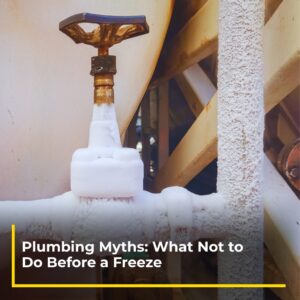
According to the Insurance Information Institute, water damage from frozen pipes is one of the most common and costly winter claims, with the average insurance payout topping $10,000. Don’t wait until the first freeze to act, take the right steps now for reliable winter pipe protection.
With proper planning and professional support, you can avoid the stress and expense of burst pipes. Trust Lion Home Service for expert frozen pipe prevention in Colorado and enjoy peace of mind all winter long.
This myth-busting guide breaks down the most common misconceptions about frozen pipes and gives you expert-backed insights on winter pipe protection that actually works.
Myth #1 – “I Don’t Need to Worry Until It Actually Freezes”
Reality: By the time temperatures drop below freezing, it may already be too late. Pipes exposed to prolonged cold can freeze overnight, and prepping your home takes planning.
Lion Pro Tip: Our local technicians know Colorado’s freeze patterns and offer seasonal plumbing inspections, pipe insulation, and shutoff prep before the cold hits.
Myth #2 – “Leaving Faucets Dripping Prevents Frozen Pipes”
Reality: This tactic only helps in select situations, like homes with very specific plumbing layouts. It’s not a reliable method on its own.
Lion Pro Tip: We install pipe insulation and use advanced detection to identify vulnerable spots, giving your plumbing more than just a temporary fix.
Myth #3 – “My Pipes Are Safe Because They’re Indoors”
Reality: Pipes along exterior walls, in unheated basements, crawl spaces, and garages are all at risk, even though they’re technically “inside.”
Lion Pro Tip: During our fall inspections, we check high-risk indoor zones that are most often overlooked by homeowners.
Myth #4 – “I Can Winterize My Plumbing Without Help”
Reality: Many DIY winterization attempts skip critical steps, such as properly draining outdoor hose bibs, sealing crawl spaces, or testing pressure valves.
Lion Pro Tip: Our winter plumbing packages take care of it all, from shutoff valves to full home system assessments, so you’re not left guessing.
Myth #5 – “Insulating Pipes Is Overkill”
Reality: Pipe insulation is one of the most affordable and effective ways to prevent pipe freezes and bursts.
Lion Pro Tip: We use durable, high-grade insulation to wrap exposed pipes quickly and professionally, reducing freeze risk significantly.
Winter Plumbing FAQ
Q: At what temperature do pipes freeze in Colorado?
A: Pipes can start to freeze when temps drop below 20°F for several hours, but wind chill and exposure can speed up the process.
Q: How do I prepare my pipes for a freeze?
A: Insulate exposed pipes, disconnect and drain outdoor hoses, seal crawl space vents, and schedule a professional plumbing inspection.
Q: Should I leave faucets dripping during a freeze?
A: Only as a supplemental measure, and only on vulnerable lines, insulation and sealing are much more reliable.
Winter Plumbing Maintenance Services from Lion Home Service
When it comes to frozen pipe prevention in Colorado, Lion Home Service offers:
- Whole-home plumbing inspections
- Custom winterization solutions
- Professional-grade pipe insulation
- Outdoor faucet draining and shutoff
- Emergency shut-off valve checks
Let our pros handle the prep so you can enjoy peace of mind, no matter how low the temperature drops.
Ready to protect your plumbing from freezing temperatures? Reach out today to schedule a full winterization service, call, text, or book online and let Lion Home Service take the guesswork out of winter pipe protection.
Here at Lion Home Service, we pride ourselves on being a full-service plumbing company for the following locations:
- Fort Collins plumbers
- Loveland plumbers
- Greeley plumbers
- Longmont plumbers
- Windsor plumbers
- Boulder
- Estes Park
- Bellvue
- Fort Lupton
- Eaton
- Fort Morgan















